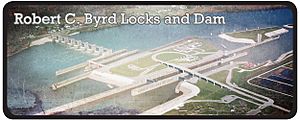Robert C. Byrd Lock and Dam facts for kids
Quick facts for kids Robert C. Byrd Lock and Dam |
|
|---|---|
 |
|
| Official name | Robert C. Byrd Lock and Dam |
| Location | Ohio/West Virginia border |
| Coordinates | 38°40′54″N 82°11′24″W / 38.6816°N 82.1900°W |
| Construction began | August 25, 1937 |
| Opening date | October 1937 |
| Construction cost | Lock Replacement $244,550,000 Dam Rehabilitation $46,700,000 |
| Operator(s) | |
| Dam and spillways | |
| Type of dam | 8 Roller gates |
| Impounds | Ohio River |
| Length | 1,132 feet |
| Reservoir | |
| Normal elevation | 538 feet above sealevel |
The Robert C. Byrd Lock and Dam is a very important structure on the Ohio River. It helps boats and barges travel safely along the river. This dam is located right where the states of Ohio and West Virginia meet. It was once known as the Gallipolis Lock and Dam.
Contents
About the Robert C. Byrd Lock and Dam
The Robert C. Byrd Lock and Dam is the 10th lock and dam system on the Ohio River. It is located about 280 miles downstream from the city of Pittsburgh. This system helps manage the river's water levels. It also allows large boats to move up and down the river easily.
What is a Lock and Dam?
A lock and dam system helps control the water level of a river. The dam part holds back water to create a deeper pool. This deeper water helps boats travel more easily. The lock part is like a water elevator for boats. It lets boats move between different water levels.
How the Locks Work
The Robert C. Byrd Lock and Dam has four locks. These locks are chambers that fill with or empty water. This process raises or lowers boats to match the river's level.
- Main Lock: This lock is 1,200 feet long and 110 feet wide. It is used for large commercial barges. These barges carry many goods.
- Auxiliary Lock: This lock is 600 feet long and 110 feet wide. It is used when the main lock is busy or needs repairs.
- Smaller Locks: There are also two smaller locks. These are used for smaller boats, like recreational boats.
History of the Dam
Construction on the Robert C. Byrd Lock and Dam began on August 25, 1937. It was opened to traffic in October 1937. The dam was originally named the Gallipolis Lock and Dam. It was later renamed to honor Robert C. Byrd. He was a long-serving United States Senator from West Virginia.
Over the years, parts of the dam have been updated. For example, the lock system has been replaced. This work cost about $244.5 million. The dam itself has also been repaired. These repairs cost around $46.7 million. These updates help the dam work well for many years.
| Locks and dams of the Ohio River | ||
|---|---|---|
|
||
| Upstream: Racine Lock and Dam |
Downstream: Greenup Lock and Dam |
|
 | Mary Eliza Mahoney |
 | Susie King Taylor |
 | Ida Gray |
 | Eliza Ann Grier |

